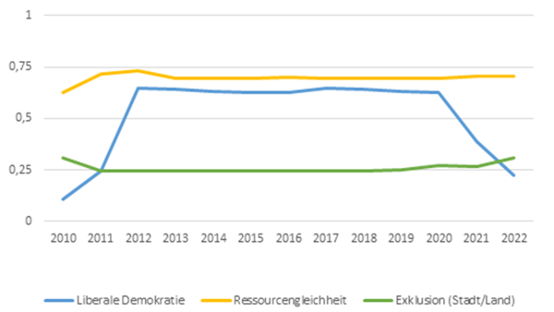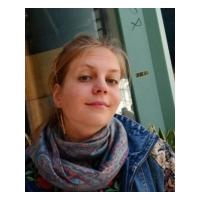Tunisia, once a beacon of hope after the Arab Spring due to promising democratisation movements, is now once again an autocracy. Under the rule of President Kais Saied, however, not only basic democratic values are suffering, but also the economy, basic human rights and with them a large part of the population.
Many people today leave Tunisia because they are committed to issues that are considered oppositional. Because their identity as queer is persecuted or denied. Because individual freedoms are trampled as soon as the Saied government's line is questioned.
In April this year, the popular opposition politician Rached Ghanouchi, leader of the Islamic Ennahda party, was arrested, and more recently, on 4 October, Abir Moussi, supporter of the Free Constitutional Party (PDL), was also arrested. He had organised demonstrations against Saied. The same fate has befallen journalists who voice criticism, such as the head of the independent radio station Mosaique FM, Nourredine Boutar. But discontent is also growing among the population as a whole, which is reflected, among other things, in the low voter turnout. Only 8% of the population cast a vote in the last parliamentary election in December 2022, with most opposing parties calling for a boycott.
With the assumption of power by the political newcomer Kaies Saied in 2019, the Tunisian state, once marked by a promising democratisation movement after the Arab Spring, is turning into an autocracy. There is no longer a separation of powers to speak of and the people's representation is weakened, while power is concentrated in the office of the President.
Tunisia, once a beacon of hope, is gradually losing the freedoms it fought for, says Heba Morayef, Amnesty International's Regional Director for the Middle East and North Africa: “Decree by decree, blow by blow, President Saied and his government have dramatically undermined respect for human rights in Tunisia since his power grab in July 2021. In doing so, he has stripped away basic freedoms that Tunisians fought hard to earn and fostered a climate of repression and impunity. The Tunisian authorities must immediately reverse this treacherous trajectory and uphold their international human rights obligations.”
The German Institute for Global and Area Studies sees the reasons for the rapid destabilisation of democratic structures in the lack of trust of Tunisian citizens in their new democratic institutions and representatives, who only insufficiently represented their concerns. In addition, the economic situation, poverty and socio-economic inequality had worsened over the years following the Arab Spring, leading to further frustration among the population. The exclusion of the rural population hardly changed in the aftermath of 2011. Research shows that practically all advances in terms of democracy made between 2011 and 2020 have been reversed since Saied came to power.

This hate-speech led to a wave of violence against people from sub-Saharan African countries: forced evictions, dismissals, and the deportation of 1200 irregular migrants abandoned by Tunisian authorities and a vigilante group in the desert bordering Libya.
Tunisia has long been the point of departure for many migratory flows: 7359 people, more irregular migrants than ever before, crossed the Mediterranean to Italy in the week of 24 July.
Tunisia is primarily a transit country. About 60% of the crossings start from the Tunisian city of Sfax in the direction of Lampedusa. The number of migrants is increasing compared to previous years. Mainly people from West African countries (ECOWAS) set off, but 20% of those fleeing are Tunisians.
According to the Tunisian newspaper Assabah, 90% of young Tunisians are thinking about leaving Tunisia. Skilled workers, especially in the medical field, are looking for better-paid jobs abroad. At the same time, 40 % of young Tunisians are prepared to take the path of illegal migration. Tunisia is thus losing an entire generation.
Young people in particular are among those who want a better future for themselves. The Tunisian state cannot offer them freedom, representation of their interests, financial stability or prospects.
Instead: high inflation, low wages, no jobs. A UN study showed that a quarter of young people are not integrated in the education or labour market. The main cause, it said, was a lack of qualifications, but also insecure social circumstances and learning difficulties. The Tunisian artist and journalist Lotfi Ben Sassi has created an entire comic strip on this subject: to leave or to stay is the question with which he opens. (Original:Partir ou Rester ) He says: "In the past, the investment for a parent was to build a house for his child. Today, on the other hand, it consists of keeping the money to eventually send his child abroad to study: And we know very well that a child who studies abroad never comes back."
To address the economic problems, the Tunisian president is focusing on closer cooperation with the EU. An agreement on early financial aid has already been reached, but Saied rejects the conditionality via the International Monetary Fund and also described the EU financial aid as "charity".
The reasons for Saied's rejection are not entirely clear. A geopolitical reorientation away from the West would fit into Saied's "anti-colonial" idelogy, towards an "auto-centred" development, as the President himself emphasises. This is supported by the fact that, according to the Chinese foreign ministry, there have been talks about financial support from the BRICS (Brazil, Russia, India, China and South Africa). "We support promoting discussions among BRICS members on BRICS expansion process." Moreover, Saudi Arabia also provided financial aid shortly after the signing of the memorandum between Tunisia and the EU, which naturally influences the negotiation situation.
Although a stalemate has already been attested here, a Memorandum of Understanding for a "strategic and comprehensive partnership" between Tunisia and the EU was signed on 16 July 2023.
This puts Tunisia in the focus of European migration policy. As the country is considered a gateway and transit country for migrants, the EU wants to invest millions of euros to promote migration management.... The ideas for containment are there: the fight against smuggling, the repatriation of irregular migrants from sub-Saharan Africa residing in Tunisia to their countries of origin [...] the repatriation of Tunisians without residence permits in the EU and the support of the Tunisian coast guard with new equipment for search and rescue operations, the procurement of 8-9 new patrol boats and the refurbishment of 17 boats [...]".
Obviously, the focus here is not on the protection of basic human rights or even humanitarian aid, but on the promotion of the border police. The EU is focusing on isolation - according to the Tunisian Forum for Economic and Social Rights (FTDES), the deal thus promotes Tunisia from European "border police" to European "prison guard". Once again, the EU is saying goodbye to its humanitarian ideals, as is clearly demonstrated here. At least the mistreatment of people is then not taking place on its own territory.
„We now need a responsible and solidary Europe, not to absorb all the misery of the world, but to save the world from sinking into chaos“ manifests the President of the Tunisian Forum for Economic and Social Rights, Abderrahmane Hedhili. A Europe that should make humanitarian and democratic values the basis of its policy, instead of relying on isolationism and supporting autocrats.



